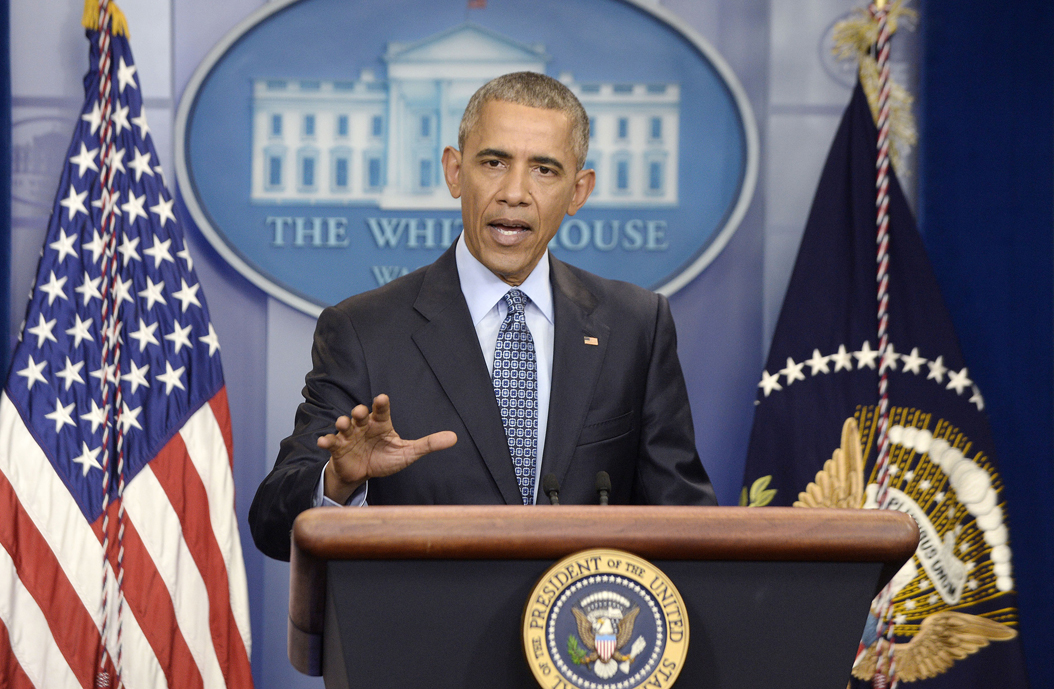Editorial: Chelsea Manning sentence commuted, a long overdue step


In his final press conference on Wednesday, President Barack Obama defends his decision to commute the prison sentence Chelsea Manning. Olivier Douliery/Abaca Press/TNS
The last days of President Barack Obama’s administration are shaping up to be some of its most important.
Aside from the flood of executive orders leaving the president’s desk in the past weeks since the election, Obama marked his last few days in office with a series of pardons. Among the most controversial — particularly with the incoming administration — was Chelsea Manning’s. The former military intelligence contractor, who had been sentenced to 35 years in prison in 2010 for leaking military secrets, will have to serve out about four more months before being set free.
Manning’s saga in the public eye began two years into the Obama administration when she coordinated one of the biggest leaks of classified information in U.S. history. The leak exposed countless abuses committed by the U.S. military in Iraq, with a particularly strong focus on the military’s apparent lack of concern for considerable civilian casualties.
Since then, she’s been beset by critics on the right like Paul Ryan, John McCain and Donald Trump, who have equated her “troubling” actions with “dishonor” and “treachery.” But what’s been particularly troubling about Manning’s case is the Democrats’ willingness to join in on the crackdown on whistleblowers. They provide an invaluable line of defense in keeping our government honest, and the bipartisan consensus against them is more than a little concerning.
Manning’s trial and conviction, after all, occurred under a Democratic administration with Democratic sanction. In 2011, Obama defended his hardline stance on Manning to a heckler by saying that, “We’re a nation of laws, we don’t make our own individual decision about how the laws operate,” concerningly echoing the law-and-order rhetoric more characteristic of Republicans.
When Manning was tried and convicted in 2010, her public identity was still restricted to that of a whistleblower. Manning, who came out in 2013 as transgender, was still Bradley Manning — a 24-year-old man.
Manning’s transition from male to female didn’t begin until after she was placed in an all-male military prison in Fort Leavenworth, Kansas. Both her situation as a transgender woman in an all-male institution and military officials’ protracted refusal to allow her access to gender reassignment treatment led to repeated, unsuccessful suicide attempts.
As progressive as Obama’s record on LGBTQ+ rights might be, his refusal to mitigate Manning’s cruel and unusual punishment is deeply concerning and directly put her life in danger.
The move to pardon Manning represents a welcome but surprising shift for Obama in his last hours in office, both in terms of showing support for whistleblowers and for LGBTQ+ Americans. Margaret Huang, executive director of Amnesty International, pointed out in a press release following the pardon that Manning “exposed serious abuses, and as a result her own human rights have been violated.” Manning’s punishment was seriously inappropriate, and the value of the original action itself of exposing abuses makes it questionable whether it should have been punished at all. Despite how late it arrived, the pardon was undoubtedly deserved.
The clemency serves as a stark contrast to what is likely to come for both issue areas after the Inauguration tomorrow.
It’s only disappointing it couldn’t have come any sooner.
Recent Posts
SGB introduces new governing code bill and addresses rumors of ICE on campus
At its weekly meeting at Nordy’s Place on Tuesday, Student Government Board introduced an omnibus…
Opinion | School should be in the summer
Although this may be controversial, I believe that from this data, it is evident that…
Weathering the storm: Pittsburgh teams have tackled some of the toughest environments
The end of the year in western Pennsylvania is always marked by two things —…
Notes From an Average Girl // Notes on Book Banning
In this edition of Notes From an Average Girl, senior staff writer Madeline Milchman writes…
To Be Honest // Yup, it is that damn phone
In this edition of To Be Honest, staff writer Evin Verbrugge writes about her phone…
Meaning at the Movies | Portraying Toxic ‘Adolescence’
In this edition of Meaning at the Movies, staff writer Lauren Deaton explores the mini-series…

